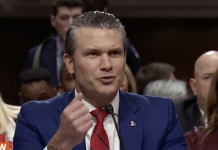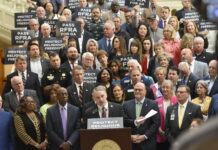
ATLANTA (GA Recorder) — Supporters of a sweeping mental health bill are defending the proposal after it was met with spirited opposition in the Senate this week.
The bipartisan bill has the full backing of House Speaker David Ralston, who has called the measure his top priority for the year. The Blue Ridge Republican reiterated his support Wednesday as a Senate panel wrapped up a series of hearings, and he touted a list of the groups supporting the bill, such as the state chamber of commerce and several health care systems.
“This is a good and meaningful bill that will help many people in Georgia who are suffering,” Ralston said in a statement. “I am proud that we have the backing of some of the most recognized names in our state – from world-class health care providers to leading businesses.”
Dr. Dan Salinas, chief community clinical integration officer at Children’s Healthcare of Atlanta, told senators he believes the proposal would improve a system that is currently failing some children. Dozens of children in crisis have repeatedly shown up at the hospital’s Atlanta emergency room in the last couple of years. One of them has been there 66 times.
“I think we have an opportunity to shift the focus over into prevention, early intervention and better intervention by having better access and care coordination,” Salinas said.
Advocates and lawmakers early on rallied behind a call to step up enforcement of a 14-year-old federal law requiring health insurers to treat behavioral health benefits on par with medical care.
But the speaker’s proposal, H.B. 1013, goes much further. It would also change the criteria for having someone involuntarily committed for treatment, create a service cancelable loan program to help bolster the workforce providing behavioral health services, and ensure a certain percentage of money in public-funded insurance programs goes to patient care and not administrative costs.

The bipartisan bill overwhelmingly passed the House earlier this month with just three Republicans voting against it, but some GOP state senators have since questioned whether the bill goes too far.
The House proposal has also been met with loud opposition in the last week, thrusting it suddenly into election-year politics. At least one Trump-endorsed statewide GOP candidate has come out against it, and conservative activists have branded it as a “Staceycare” after Democrat Stacey Abrams voiced support for the package on the campaign trail.
Inside the packed committee room Wednesday, a mixture of pro- and anti-H.B. 1013 signs could be seen throughout the audience.
Several of the speakers opposing the bill Wednesday said they were not affiliated with any groups. But others said they learned about the bill through groups like Truth in Education, which opposes so-called critical race theory in schools.
Critics have panned the bill as too far-reaching and pointed to a range of concerns, including references to the World Health Organization’s definitions for mental health conditions and potential implications for gun rights.
“I do support and think that there needs to be a lot of reform on mental health, but if it in any way infringes on the parent being the expert, I am very much against it,” said Toni Samuelu, who said she became more politically active after the “COVID-19 lockdown debacle.” “We as parents are the No. 1 experts in our children’s lives.”
The bill’s supporters attribute much of the opposition to misinformation circulating online. That’s why Kim Jones, executive director of NAMI Georgia, shrugged off the sudden opposition.
“What we are seeing and what we have people here talking about aren’t what’s in the bill,” Jones said after Wednesday’s hearing.
For example, Jones said she was stumped by concerns that a parent’s authority over their child’s mental health would be compromised under the bill.
“I’ve read that bill several times, and I don’t know what they’re referring to,” Jones said. “What we do want is more care and access to children who are having mental health concerns – period.”
A revised version of the proposal is expected to emerge early next week. The bill must advance out of the full Senate Health and Human Services Committee by next Wednesday as the clock starts to wind down on this year’s legislative session.







